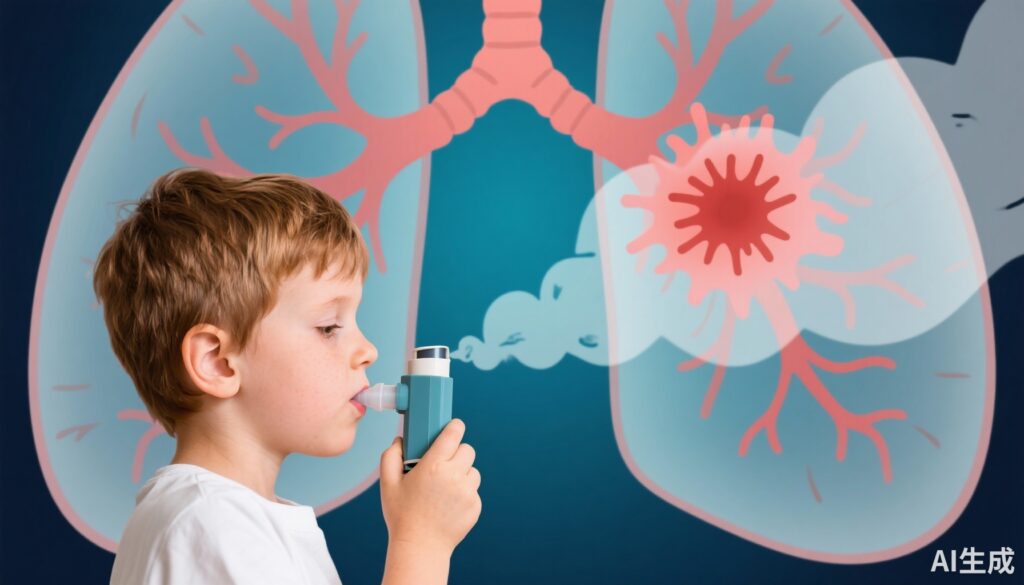Highlight
- The CARE trial is the first large-scale randomized study to evaluate budesonide-formoterol as reliever therapy versus salbutamol in children with mild asthma.
- Budesonide-formoterol reliever monotherapy significantly reduced the annualized rate of asthma attacks by 45% compared to salbutamol in children aged 5-15 years.
- Both treatments exhibited similar safety profiles, with adverse events occurring at comparable rates.
- This study supports guideline reconsideration for pediatric asthma reliever therapy, incorporating inhaled corticosteroid-formoterol as a safe and effective option.
Study Background and Disease Burden
Asthma is one of the most common chronic respiratory diseases in children worldwide, characterized by airway inflammation, hyperresponsiveness, and episodic airflow obstruction. In children aged 5 to 15 years, mild asthma remains prevalent, and effective reliever therapies are essential to improve disease control and prevent exacerbations. Traditionally, short-acting β2-agonists (SABAs) such as salbutamol have been the mainstay for symptom relief. However, emerging evidence in adults indicates that combination inhaled corticosteroid (ICS)-formoterol reliever therapy reduces asthma exacerbations more effectively than SABA monotherapy by addressing airway inflammation alongside bronchodilation.
Despite these advances, the comparative efficacy and safety of ICS-formoterol reliever therapy in the pediatric population has remained inadequately studied. Given developmental differences in airway physiology and drug responsiveness in children, direct evidence was needed to inform clinical guidelines and practice. The CARE (Children Asthma Reliever Efficacy) study was designed to address this critical knowledge gap by comparing budesonide-formoterol reliever monotherapy against salbutamol reliever monotherapy in children with mild asthma over one year.
Study Design
CARE was a 52-week, open-label, parallel-group, multicenter, superiority randomized controlled trial conducted at 15 clinical trial sites across New Zealand. The study population included children aged 5-15 years diagnosed with mild asthma who were utilizing SABA reliever therapy without maintenance inhaled corticosteroid treatment prior to enrollment.
Participants were randomized on a 1:1 basis to receive either:
– Budesonide 50 μg-formoterol 3 μg inhaler (two actuations as needed)
– Salbutamol 100 μg inhaler (two actuations as needed)
The primary outcome was the rate of asthma attacks per participant per year, with attacks defined according to standard clinical criteria involving worsening symptoms requiring systemic corticosteroids or hospital visits. Secondary endpoints included adverse events and participant-reported outcomes. The trial was registered with the Australian New Zealand Clinical Trials Registry (ACTRN12620001091998).
Key Findings
Between January 28, 2021, and June 23, 2023, 382 children were screened, and 360 were randomized (179 to budesonide-formoterol and 181 to salbutamol). The analysis demonstrated a significant reduction in asthma attack rate for the budesonide-formoterol group compared to salbutamol:
– Annualized asthma attack rates were 0.23 attacks per participant per year in the budesonide-formoterol group versus 0.41 attacks in the salbutamol group.
– This corresponds to a relative rate reduction of 45% (relative rate 0.55; 95% confidence interval [CI] 0.35–0.86; p=0.012).
Safety results showed that adverse events were common but comparable between groups:
– 91% of participants in the budesonide-formoterol group and 92% in the salbutamol group experienced at least one adverse event.
– The odds ratio for experiencing any adverse event with budesonide-formoterol versus salbutamol was 0.79 (95% CI 0.35–1.79), indicating no significant difference.
The open-label study design reflected real-world medication use, enhancing external validity. Participants tolerated budesonide-formoterol well, with no safety concerns emerging during prolonged use.
Expert Commentary
The CARE trial provides pivotal evidence supporting the use of combination ICS-formoterol reliever therapy in children with mild asthma. The findings align with adult data demonstrating that addressing airway inflammation during symptomatic episodes prevents disease worsening better than bronchodilation alone with SABAs.
Potential advantages of budesonide-formoterol include simultaneous anti-inflammatory and bronchodilator effects, less reliance on beta-agonists alone, and potentially improved adherence through simplified regimens. The safety profile in this pediatric population also appears favorable, consistent with established ICS safety in children.
Nonetheless, the open-label design may introduce bias in symptom reporting, and long-term effects beyond one year remain to be established. Generalizability to diverse healthcare settings and populations requires further confirmation. Current asthma management guidelines may consider integrating these findings to optimize pediatric asthma control.
Conclusion
The CARE trial robustly demonstrates that budesonide-formoterol reliever monotherapy significantly reduces asthma attacks compared to salbutamol in children aged 5-15 years with mild asthma, without compromising safety. These results support shifting pediatric asthma reliever therapy toward ICS-formoterol, offering a more effective and safe strategy to prevent exacerbations and improve disease management.
Future research should explore longer-term outcomes, cost-effectiveness, and implementation strategies to translate these findings into everyday clinical practice. Meanwhile, clinicians can consider budesonide-formoterol reliever therapy as an evidence-based option to enhance pediatric asthma care.
References
Hatter L, Holliday M, Oldfield K, et al. Budesonide-formoterol versus salbutamol as reliever therapy in children with mild asthma (CARE): a 52-week, open-label, multicentre, superiority, randomised controlled trial. Lancet. 2025 Oct 4;406(10511):1473-1483. doi: 10.1016/S0140-6736(25)00861-X. Epub 2025 Sep 28. PMID: 41033330.
GINA. Global Strategy for Asthma Management and Prevention. 2023 Update. Global Initiative for Asthma. Available from http://ginasthma.org
National Asthma Education and Prevention Program. Expert Panel Report 4: Guidelines for the Diagnosis and Management of Asthma. NIH Publication No. 08-4051. 2007.


